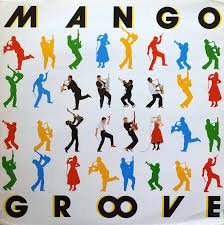A Morning Groove
I use music and caffeine to lift me out of my morning blues. My need was great this morning; a gray, cold, and wet morning after drenching rain all night. I turned to an extra ration of caffeine (three Diet Cokes instead of two) and music that got me up off the couch and dancing about the room. I kid you not! I was up and moving at 77 years of age. The music was the song “Durban Road” by Mango Groove, a group that makes feel-good music and has dared to stand up to tyranny. More about that below. First, I want to tell you what–besides “Durban Road”–got me off the couch.
I recently finished “Ninth Street Women . . .” by Mary Gabriel.* It comprises the biographies of five painters working in New York in the mid-20th Century. They and other members of the avant-garde would gather every night in seedy, run-down taverns to drink, talk, and dance. They danced wildly, even if they didn’t know how to dance; just moving for the sake of moving. These painters, musicians, and writers lived a lifestyle that one could condemn as hedonistic except they worked hard all day in cheap, run-down, cold-water flats.
If they can dance wildly, why can’t I? I did. My wild gyrating lasted two minutes, then I slowed down and ”did a lazy sway.”**
All this did the trick to move me up and out of the Monday Morning Blues. Back to Mango Groove. It’s a South African group of a dozen or so musicians. Its music is a mix of pop and township. Township is music emanating from the poor ghettos or townships that were the only places black Africans were allowed to live under apartheid. It’s strikingly joyous music given the living conditions within which it was produced.
Mango Groove is a multi-ethnic group that played for their first seven years under apartheid. The “government’s policies of enforced racial segregation made accommodations, booking, and travel more difficult if not dangerous. Sometimes when they arrived at a club to perform, they were refused entry because they were multi-ethnic. On one occasion, John Leyden (a white man) was arrested on a charge of loitering after he gave a ride home to bandmate Jack Lerole (a black man).” *** They played for Nelson Mandela’s inauguration concert to an audience of 100,000 people.
According to lead singer Claire Johnston, “We weren’t overtly political. The only song that was was ‘Another Country’. But we changed the hearts and minds of people in a way politicians cannot.” *** ABC’s Nightline covered Mandela’s release from prison in 1990 using the band’s “We Are Waiting”. Thirty million people watched the show.
Here is another Mango Groove song, “Pennywhistle”. The pennywhistle is one of my favorite instruments most often heard in South African music and Irish music. It’s called a tin whistle in Irish music. “The Wind That Shakes the Barley” is a good song by The Chieftains that features the tin whistle.
*Gabriel, Mary, “Ninth Street Women: Lee Krasner, Elaine de Kooning, Grace Hartigan, Joan Mitchell, and Helen Frankenthaler” This is a fine book; very entertaining and informative. Well worth reading.
** from Langston Hughes’s poem “The Weary Blues”
*** Wikipedia article, “Mango Groove”
It simmers & simmers,
the music that learns us;
The Mamas & the Papas
Queen Latifah singing
"California Dreamin'."
The ear is nobody's fool.
—from the poem “The ear is nobodies fool” by Rodney Terich Leonard
